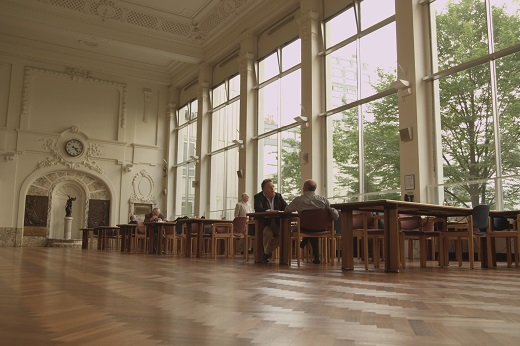Antwerp Bans Lab-Grown from Trading Floors
 RAPAPORT... The Federation of Belgian Diamond Bourses has introduced aban on lab-grown sales in Antwerp's four trading halls. While synthetics trading is still rare in Antwerp, theumbrella group took action last month because it views the exchanges as promotersof natural diamonds, explained Willy Rotti, president of the federation.Lab-grown will still be permitted in companies' offices, where most transactionsoccur. "There was not [previously] a formal order that the trade oflab-grown diamonds was allowed or forbidden in the exchange, so we made it veryclear: No trading of lab-grown in the trading hall," Rotti told RapaportNews this week. "Before that, as far as we know, there was never trading oflab-grown in the exchange, but we put it [as] an announcement to make it veryclear to the members." The federation placed notices in the bourses to informmembers, dated September 19, and plans to reprimand those who fail to comply."We don't have a precedent, but I imagine there will be a fine and a sanctionfor a period," Rotti added. Antwerp has four diamond exchanges: The Antwerp DiamondBourse, the Antwerpsche Diamantkring (for rough trading), the Diamond Club ofAntwerp and the Vrije Diamanthandel. The Federation of Belgian Diamond Bourses canmake decisions on behalf of those exchanges, as its board includes representativesof all those groups. The Antwerp bourses have members that trade in bothlab-grown and natural diamonds, but none that are purely synthetics dealers. Letting in such companies in the future would help the bourses maintain control over themarket, as they would have the power to punish those who sell under falsepretenses, Rotti said. However, it would also create an odd situation in whichthere are members that can't do business on the trading halls, he noted,although they would have access to the offices and other benefits. Exchanges around the world have been debating how to dealwith companies that wish to sell lab-grown. The Bharat Diamond Bourse (BDB) inMumbai is considering lifting its ban on synthetics, with India's NaturalDiamond Monitoring Committee currently assessing how to regulate the change andensure segregation, Anoop Mehta, president of the BDB, told Rapaport NewsThursday. "We won't consider anything unless we are really clear aboutthe guidelines and rules, because we don't want to get a bad reputation for theindustry," Mehta pointed out. The Israel Diamond Exchange has held discussions about thesector this year. In May, the Dubai Diamond Exchange hosted the first tender ofrough synthetic diamonds to take place at any member of the World Federation ofDiamond Bourses (WFDB). The WFDB gives its members independence to decide onthese issues themselves, its president, Ernie Blom, said at the time. In January 2017, the Federation of Belgian Diamond Bourses adoptedWFDB's rules requiring clear descriptions on invoices and memo documents, andagreed to take disciplinary action against companies that fail to comply. Image: The Antwerp Diamond Bourse trading floor. (Antwerp World Diamond Centre)
RAPAPORT... The Federation of Belgian Diamond Bourses has introduced aban on lab-grown sales in Antwerp's four trading halls. While synthetics trading is still rare in Antwerp, theumbrella group took action last month because it views the exchanges as promotersof natural diamonds, explained Willy Rotti, president of the federation.Lab-grown will still be permitted in companies' offices, where most transactionsoccur. "There was not [previously] a formal order that the trade oflab-grown diamonds was allowed or forbidden in the exchange, so we made it veryclear: No trading of lab-grown in the trading hall," Rotti told RapaportNews this week. "Before that, as far as we know, there was never trading oflab-grown in the exchange, but we put it [as] an announcement to make it veryclear to the members." The federation placed notices in the bourses to informmembers, dated September 19, and plans to reprimand those who fail to comply."We don't have a precedent, but I imagine there will be a fine and a sanctionfor a period," Rotti added. Antwerp has four diamond exchanges: The Antwerp DiamondBourse, the Antwerpsche Diamantkring (for rough trading), the Diamond Club ofAntwerp and the Vrije Diamanthandel. The Federation of Belgian Diamond Bourses canmake decisions on behalf of those exchanges, as its board includes representativesof all those groups. The Antwerp bourses have members that trade in bothlab-grown and natural diamonds, but none that are purely synthetics dealers. Letting in such companies in the future would help the bourses maintain control over themarket, as they would have the power to punish those who sell under falsepretenses, Rotti said. However, it would also create an odd situation in whichthere are members that can't do business on the trading halls, he noted,although they would have access to the offices and other benefits. Exchanges around the world have been debating how to dealwith companies that wish to sell lab-grown. The Bharat Diamond Bourse (BDB) inMumbai is considering lifting its ban on synthetics, with India's NaturalDiamond Monitoring Committee currently assessing how to regulate the change andensure segregation, Anoop Mehta, president of the BDB, told Rapaport NewsThursday. "We won't consider anything unless we are really clear aboutthe guidelines and rules, because we don't want to get a bad reputation for theindustry," Mehta pointed out. The Israel Diamond Exchange has held discussions about thesector this year. In May, the Dubai Diamond Exchange hosted the first tender ofrough synthetic diamonds to take place at any member of the World Federation ofDiamond Bourses (WFDB). The WFDB gives its members independence to decide onthese issues themselves, its president, Ernie Blom, said at the time. In January 2017, the Federation of Belgian Diamond Bourses adoptedWFDB's rules requiring clear descriptions on invoices and memo documents, andagreed to take disciplinary action against companies that fail to comply. Image: The Antwerp Diamond Bourse trading floor. (Antwerp World Diamond Centre)